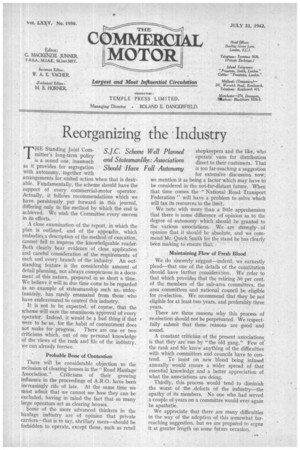Reorganizing the Industry
Page 15

If you've noticed an error in this article please click here to report it so we can fix it.
THE Standing Joint Committee's long-term policy is a sound one, inasmuch as it provides for segregation with autonomy, together with arrangements for united action when that is desirable. Fundamentally, the scheme should have the support of every commercial-motor operator. Actually, it follows recommendations which we have persistently put forward in this journal, differing only in the method by Which the end is achieved. We wish the Committee every success in its efforts.
A close examination of the report, in which the plan is outlined, and of the appendix, which embodies a description of the method of execution, cannot fail to impress the knowledgeable reader. Both clearly bear evidence of close application and careful consideration of the requirements of each and every branch of the industry. An outstanding feature is the considerable amount of detail planning, not always conspicuous in a document of this nature, prepared in so short a time. We believe it will in due time come to be regarded as an example of statesmanship such as, unfortunately, has rarely emanated from those who have endeavoured to control this industry.
It is not to be expected, of course, that the scheme will earn the unanimous approval of every operator. Indeed, it would be a bad thing if that were to be so, for the habit of contentment does not make for progress. There are one or two criticisms which, out of our personal knowledge of the views of the rank and file of the inchistry, we can already foresee.
Probable Bone of Contention There will be considerable objection to the inclusion of clearing houses in the " Road Flaulage Association." Criticisms of their growing influence in the proceedings of A.R.O. have been increasingly rife of late. At the same time we must admit that we cannot see how they can be excluded, having in mind the fact that so many large operators act as clearing houses.
Some of the more advanced thinkers in the haulage industry are of opinion that private carriers—that is to say, ancillary users—should be forbidden to operate, except those, such as retail shopkeepers and the like, who operate vans for distribution direct to their customers. That is too far-reaching a suggestion for extensive discussion now; we mention it as being a factor which may have to be considered in the not-far-distant future. When that time comes the " National Road Transport Federation " will have a problem to solve which will tax its resources to the limit_ We note with more than a little apprehension that there is some difference of opinion as to the degree of autonomy which should be granted to the various associations. We are stronglyof opinion that it should be absolute, and we commend Mr. Quick Smith for the stand he has clearly been making to ensure that.
Maintaining Plow of Fresh Blood We do sincerely suggest—indeed, we earnestly plead—that one of the details of the constitution should have further consideration. We refer to that which provides that the retiring 50 per cent. of the members of the sub-area committees, the area committees and national council be eligible for re-election. We recommend that they be not eligible for at least two years, and preferably three years.
There are three reasons why this process of re-election should not be perpetuated. We respectfully submit that these reasons are good and sound.
A constant criticism of the present associations is that they are run by "the Old gang." Few of the rank and file know anything of the difficulties with which committees and councils have to contend. To insist on new blood being infused annually would ensure a wider spread of that essential knowledge and a better appreciation of what the associations are doing.
Thirdly, this process would tend to diminish the worst of the _defects of the industry—the apathy of its Members. No one who had served a couple of years on a committee'would ever again be apathetic.
We appreciate that there are many difficulties in the way of the adoption of this somewhat farreaching suggestion, but we are prepared to argue it at greater length on some future occasion.




















































